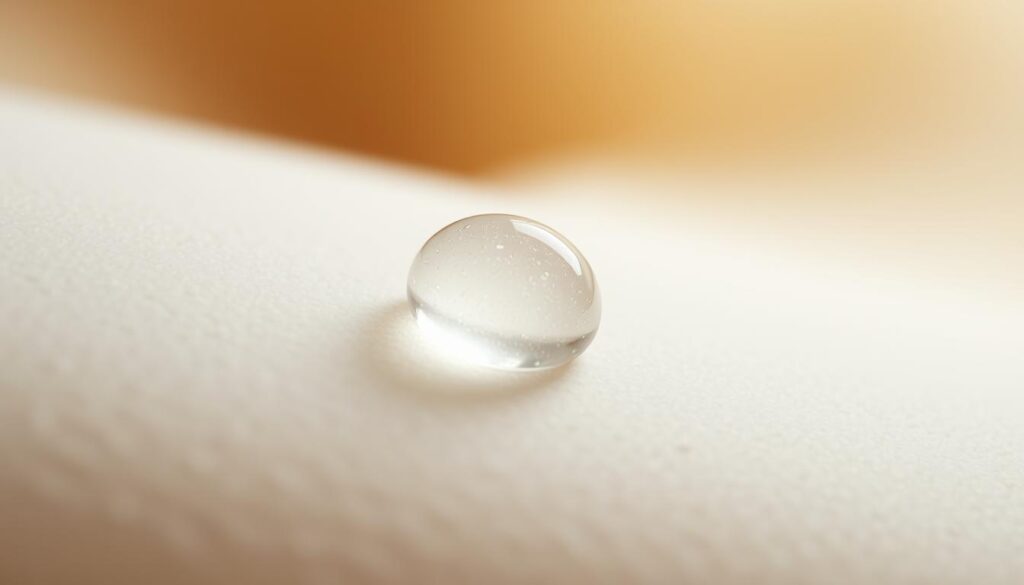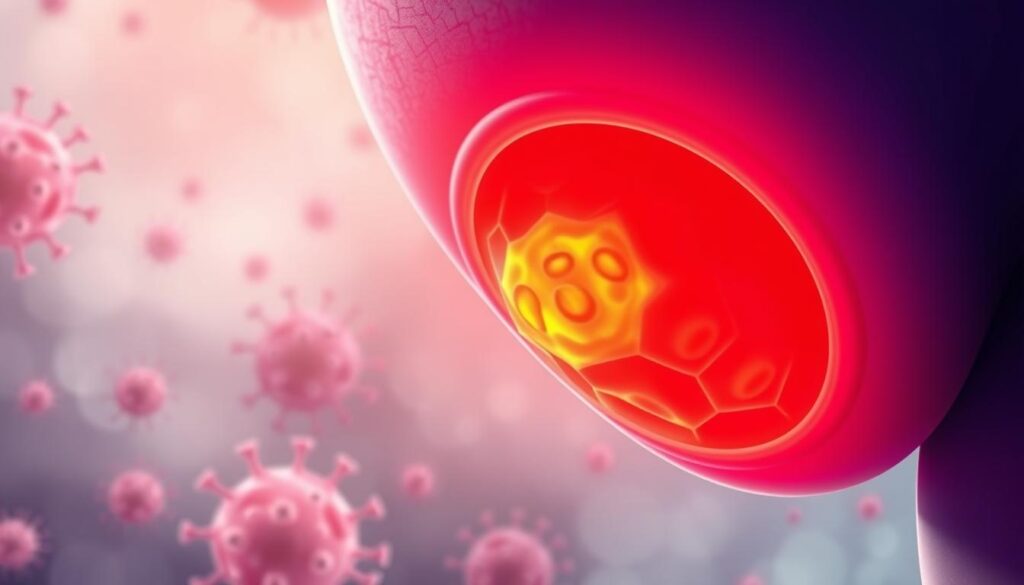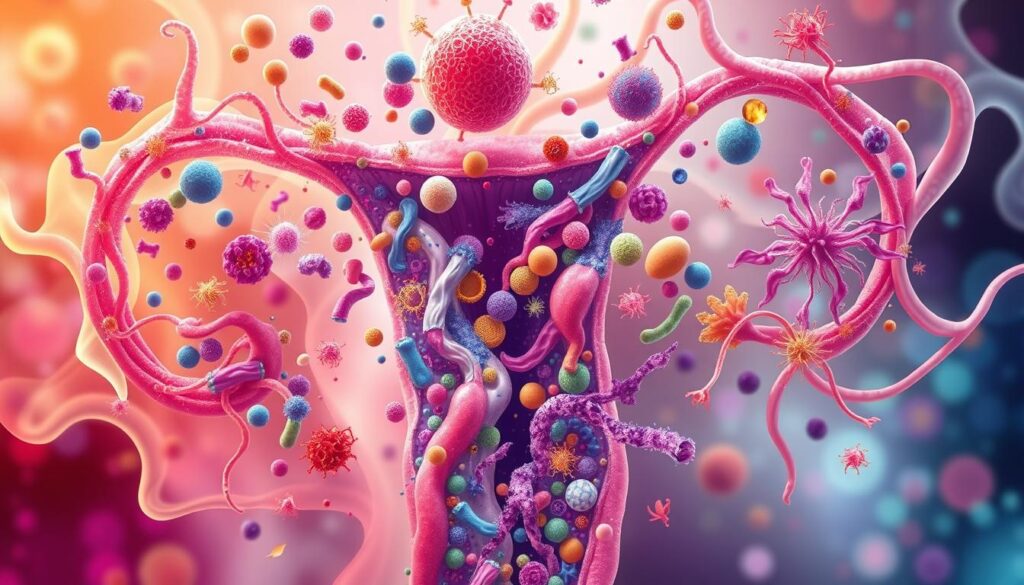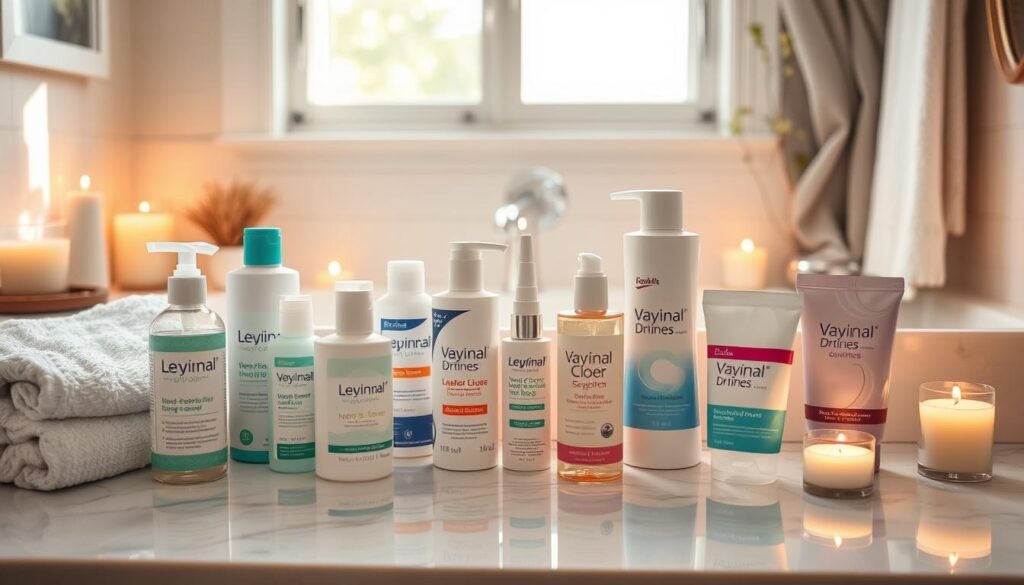Have you ever been in a moment of closeness, only to feel frustrated? You’re not by yourself. Many women struggle with vaginal dryness, which causes problems in getting aroused and being intimate. It’s a topic that’s not often talked about. This leaves many feeling alone in their experiences. If you’ve ever been embarrassed or confused about this, we wrote this article for you.
In this piece, we’ll look into why you might be feeling uncomfortable. We’ll offer insights on sexual health to aid you in these hurdles. You’re not just getting by; you’re flourishing. Grasping the causes of vaginal dryness is the first step in overcoming it. This understanding will improve your connections in intimate moments.
Key Takeaways
- Vaginal dryness affects a significant number of women, impacting their sexual health and satisfaction.
- Low estrogen levels, dehydration, and aging contribute to vaginal lubrication issues.
- Products and inflammation can also influence vaginal health.
- Emotional factors like stress and relationship dynamics play a role in arousal and intimacy.
- Hydration strategies and open communication can help in managing and preventing dryness.
- Consulting with healthcare providers can lead to effective treatment options.
Introduction to Vaginal Dryness
Vaginal dryness can really affect your day-to-day life and close relationships. Knowing about it is key because it touches many women at different times. This includes during menopause and after having a baby. About half of the women going through menopause say they have this problem. This shows how common it is and why we should know more about it.
Many things can cause vaginal dryness. One main reason is hormonal changes. For instance, lower estrogen levels are a big factor. This hormone helps keep the vagina moist. During pregnancy or when breastfeeding, around 30% of women might face this issue. Also, cancer treatments that involve radiation to the pelvic area can increase dryness for up to 60% of patients.
It’s important to know that vaginal dryness can make sex uncomfortable. Nearly 40% of those affected feel pain during intercourse. If this problem affects you, talking to a doctor could make things better.
There are many treatments available. These range from vaginal moisturizers and water-based lubricants to hormone therapies. Knowing what causes the problem and the solutions can empower you. It lets you take control of this common issue.
Understanding Vaginal Lubrication
Proper vaginal lubrication is key for comfy sexual experiences. It happens when you’re aroused and varies among individuals. There’s no set “perfect” amount. Knowing about lubrication can improve both physical comfort and emotional closeness when you’re intimate.
Things like menopause, postpartum, and breastfeeding can lower estrogen and affect lubrication. If lubrication is low, you might feel burning, itching, and irritation. This can affect how happy you are with your sex life. On average, it takes those with vaginas three times longer to lubricate naturally than those with penises, showing we need to understand these differences.
Stress, certain meds, and hormonal birth control can make lubrication less. Stress increases cortisol, which lowers estrogen and thus, lubrication. SSRIs and some allergy meds can also cause a drop in natural lubrication levels. Funny enough, even hormonal birth control impacts lubrication differently for everyone.
For good vaginal health, think about using vaginal moisturizers regularly. They’re made for daily use, not just for sex. Products like Promescent VitaFLUX for Women can help with natural lubrication by increasing blood flow and nitric oxide levels.
Both natural and bought lubricants are great for their reasons. Adequate lubrication is key for avoiding infections, reducing discomfort during sex, and making sexual experiences better overall. See the table below for common factors related to vaginal lubrication.
| Factor | Impact on Lubrication |
|---|---|
| Estrogen Levels | Low levels can reduce lubrication; often seen during menopause |
| Stress | Increases cortisol, decreases estrogen and lubrication |
| Medications | SSRIs and hormonal birth control can reduce lubrication |
| Age | Women often experience vaginal dryness during aging |

Why Can’t I Get Wet: Possible Causes
Understanding the reasons behind vaginal dryness can lead to effective management strategies. Various factors contribute to this condition, often interlinked and overlapping.
Low Estrogen Levels
Low estrogen levels have a big impact on vaginal health. This can cause dryness and discomfort. Many women go through hormonal imbalances during key life stages. These include menopause or breastfeeding.
About 50%-75% of women face vaginal dryness during menopause. This is when estrogen production drops. During breastfeeding, around 30% of women might face similar problems. This is due to changes in hormone levels. Less estrogen means the vaginal tissues get thinner and drier. This affects moisture and elasticity.
Dehydration and Hydration
Staying hydrated is key for vaginal health. Not drinking enough water can cause dehydration. This harms many tissues, including those in the vagina. Exercising a lot, being sick, or some meds like antihistamines can make dehydration worse. It’s very important to drink plenty of water. This helps your body stay naturally lubricated.
Aging and Vaginal Changes
Aging can really change vaginal health. This is especially true during menopause. It can lead to less lubrication and elasticity. Hormonal changes during menopause do more than lower estrogen. They also disrupt the vaginal microbiome. This makes dryness problems worse. Understanding these changes helps with managing vaginal health during menopause.

| Factor | Statistics | Implications |
|---|---|---|
| Women experiencing dryness during breastfeeding | 30% | Hormonal changes due to lactation impact lubrication. |
| Women reporting dryness during menopause | 50%-75% | Low estrogen levels affect vaginal moisture. |
| Women affected by smoking | Higher risk of premature menopause | Can lead to reduced moisture levels and lubrication. |
| Women on antidepressants reporting dryness | 15%-20% | Medications can contribute to vaginal discomfort. |
| Women experiencing stress-related lubrication difficulties | 60% | Stress hinders arousal and can exacerbate dryness. |
The Role of Inflammation
Vaginal inflammation can come from different sources. These include how we take care of ourselves and the products we use. Knowing about these can help keep your vaginal health in check.
Some soaps and hygiene items can irritate a lot. They cause inflammation. It’s important to pick the right products. They keep you comfortable and help your body stay lubricated naturally.
Impact of Products on Vaginal Health
Some products make dryness worse. They have chemicals or smells that irritate. Using products that are gentle and have no scent can reduce irritation. This makes you feel better overall.
Here are some tips for better vaginal health:
- Opt for unscented soaps and cleansers.
- Avoid products with harsh chemicals.
- Choose breathable fabrics for undergarments.
- Limit the use of feminine sprays or douches.
Knowing when you have inflammation is key. If you’re often uncomfortable, look at the products you’re using and how you live.
Identifying Symptoms of Inflammation
It’s good to know the symptoms of inflammation. This helps you stay aware of your vaginal health. The common signs are:
- Burning sensations
- Increased sensitivity
- Swelling or redness
Knowing these signs can help you tell the difference between just being dry and having inflammation. If these signs don’t go away, see a doctor. It might be something more serious.

Effects of Aging on Vaginal Health
Aging greatly impacts vaginal health, especially around menopause. Many women see changes that can lower their life quality. It’s key to know how hormone changes during this time can lead to symptoms of menopause. This knowledge helps in tackling sexual health issues after menopause.
Menopause and Hormonal Changes
Menopause often changes vaginal health due to a drop in estrogen. This drop can cause vaginal dryness, impacting about 50% of women after menopause. Some women in their 40s start to feel these issues before menopause. Low estrogen can make vaginal walls thin and dry, causing discomfort during sex.
Beyond menopause, breastfeeding and some meds can make dryness worse. Up to 75% of women breastfeeding experience vaginal health shifts. Vaginal moisturizers and lubricants are suggested for maintaining comfort and closeness.
Long-term Impact on Sexual Health
The effects of aging can challenge sexual health post-menopause. A drop in desire often comes from ongoing dryness and pain during sex. Research suggests regular sexual activity can make vaginal tissues more flexible. But, discomfort might deter some women, affecting their intimacy over time.
These changes can also strain emotions and relationships. Talking openly with partners can ease these issues, creating a caring space. It’s important to seek expert advice for treatment, ensuring sexual and vaginal health care through the years.

The Importance of the Vaginal Microbiome
The vaginal microbiome is key to keeping the vagina healthy. It is mostly made up of good bacteria, like Lactobacillus. These bacteria keep things balanced, control moisture, and protect the vagina. Sometimes, this balance is upset, causing issues like dryness. This is common in stages like menopause.
Lactobacillus and Vaginal Health
Lactobacillus keeps the vaginal pH healthy, between 3.5 to 4.5. This acidity stops harmful pathogens causing infections like bacterial vaginosis. Hormonal changes can reduce Lactobacillus, making the vagina less acidic and more prone to infections. Changes in hormone levels can result in discomfort and dryness.
Research on Microbiome and Dryness
Recent studies show a connection between the vaginal microbiome and dryness. After menopause, up to 83% of women may feel vaginal dryness due to hormonal shifts. Exploring these changes helps us find better solutions for dryness. Ongoing research is diving deeper into this to see how a healthy microbiome might fight dryness and improve sexual health.

Mental and Emotional Factors
Your mental and emotional health play a big role in your sexual well-being, especially when it comes to libido. Stress and anxiety can lower your interest in being close with someone. This can make you and your partner feel distant, leading to frustration and misunderstanding. It’s key to understand how your mental health affects your desire to be close with someone.
Stress and Anxiety’s Impact on Libido
Feeling stressed or anxious can make it hard to feel turned on or want intimacy. About 40 percent of women face sexual issues at some point, often because of mental strain like worrying about their performance or issues in their relationship. These problems can make sexual desire even more complicated. Talking openly with your partner about intimacy can help you overcome these problems together.
Communication in Relationships
Talking well with your partner is crucial when dealing with problems like vaginal dryness or a low libido. Creating a space where both of you can share your thoughts and feelings openly helps. Having these talks regularly can make both of you feel closer and ready to face intimacy issues. When you both are open to talking and listening, your emotional and physical bond improves.

How to Prevent Vaginal Dryness
To keep your vagina healthy, it’s smart to stay hydrated and talk openly in your relationship. These steps help avoid dryness and make intimacy better. Adding smart hydration habits can make a big difference in how you feel.
Hydration Strategies
Keeping your body hydrated is key for good vaginal moisture. Here are tips to stay hydrated:
- Drink at least 8 glasses of water every day.
- Eat foods like cucumbers, tomatoes, and watermelons that have lots of water.
- Cut down on drinks with caffeine and alcohol to avoid getting dehydrated.
- Using vaginal moisturizers regularly can also help with hydration.
Many find that more water helps them feel less discomfort from dryness. Staying hydrated plays a big part in a better sex life.
Communicating with Your Partner
Talking openly with your partner about dryness can make your bond stronger. Sharing your thoughts and worries helps you both understand what the other needs:
- Be open about how vaginal dryness affects you.
- Try out different lubricants together to see what feels best.
- Support each other in finding solutions that improve intimacy.
Supportive talks can bring you closer and make sex more enjoyable. Recognizing the value of these talks boosts your relationship and confidence.

Treatment Options for Vaginal Dryness
Vaginal dryness can really affect your life and close relationships. But, there are many treatments you can try. These range from ones you can buy yourself to ones a doctor suggests. They suit different needs and preferences.
Over-the-counter Solutions
OTC treatments are a big help for many. These options include:
- Vaginal moisturizers are for daily use and help keep you hydrated.
- Lubricants help make sex more comfortable by reducing rubbing.
- There are also special treatments like water-soluble lubricants. They work well for about 80% of people who try them first.
These products offer quick relief. They can make you feel better and more connected. Using vaginal moisturizers often works better than lubricants in the long run.
Professional Treatments
If store-bought options don’t help, it’s good to see a doctor. There are many professional treatments:
- Hormone therapy might involve creams or little inserts that help with dryness caused by hormonal changes.
- A vaginal estrogen ring releases hormones slowly over time.
- There are also nonhormonal choices like vaginal dilators or special creams to ease pain.
Your doctor can help you find the best treatment. They will consider what you need to manage vaginal dryness.

Communicating with Healthcare Providers
Getting ready for healthcare talks about vaginal dryness is key. Highlight your symptoms, lifestyle, and full medical history when you see the doctor. This approach improves treatment results and reduces worry.
What to Expect During a Consultation
Your talk with the doctor will start by looking into your symptoms and any key history. Be ready to answer questions about:
- Your menstrual cycle and any changes
- Medications you’re on, like antidepressants or antihistamines
- Changes in lifestyle, including drinking and smoking habits
- How your emotions are playing a role in your health
By knowing these details, your provider can figure out why you’re experiencing dryness. They can then create a treatment plan just for you. This info leads to taking better care of your health.
Key Questions to Ask Your Doctor
Make a list of questions to ask your doctor. This ensures you cover everything important. You might want to ask about:
- What’s causing your vaginal dryness
- The treatments you can get
- Ways to manage your symptoms
- Lifestyle changes that may help
Talking openly with your healthcare team is crucial. It helps build a partnership. This way, you can find the best path to better vaginal health together.

Home Remedies to Consider
Exploring effective home remedies can boost your vaginal health. Many options focus on hydration and comfort with safe, natural treatments. While it’s vital to follow medical advice, these methods provide extra support.
Vaginal Moisturizers and Lubricants
Vaginal moisturizers and lubricants are key for those experiencing dryness. These products are made for internal use or external application on the vulva. Here are the most common types:
- Water-based lubricants, which are easy to clean and safe with condoms.
- Silicone-based lubricants provide longer-lasting moisture but are not compatible with latex.
- Oil-based products (like coconut oil) may provide comfort but can degrade latex condoms.
Choosing the right product is crucial for your comfort and experience. Opt for options free from added fragrances or irritants.
Natural Remedies and Lifestyle Changes
Natural remedies also improve vaginal health. Essential oils like lavender and tea tree oil can soothe when used properly. Also, lifestyle changes can boost your well-being:
- Eating foods rich in water, like fruits, vegetables, and soups, helps against dehydration.
- Exercising regularly and managing stress support hormonal balance.
- Drinking enough water every day keeps you hydrated.
Using holistic approaches creates a supportive environment for vaginal health. Listen to your body and make personal adjustments for the best results.

| Product Type | Benefits | Considerations |
|---|---|---|
| Water-based Lubricants | Easy to clean, safe with condoms | May require reapplication during use |
| Silicone-based Lubricants | Long-lasting moisture | Not safe with latex condoms |
| Oil-based Lubricants | Natural feel and high comfort | Reduces condom effectiveness |
Seeking Professional Help
Many women face the issue of vaginal dryness, with about 30% encountering it at some stage. It’s vital to know when it’s time to see a doctor. If home remedies don’t work or sex becomes too painful, talk to a gynecologist. Doing so helps you manage the problem and feel better overall.
When to Consult a Specialist
Keep an eye on your symptoms. If you have ongoing dryness, especially with menopause, see a doctor. A gynecologist can find any health problems and suggest treatments. Make an appointment if you experience:
- Dryness that over-the-counter products can’t fix.
- Pain or discomfort during sex.
- Big changes in your menstrual cycle or vaginal health.
Importance of Regular Check-Ups
Regular doctor visits are key for women’s health. They can catch issues early on. You might get blood tests and other checks for vaginal health. Doctors often run thyroid tests if you’re having sex-related problems. These visits prevent health issues and give you personal advice.
Seeing a doctor can improve symptoms for 80% of women. Get professional advice and keep up with your check-ups.

Conclusion
Understanding vaginal health is crucial when talking about dryness. This article explored different causes. It also stressed that lubrication and foreplay play big roles in bettering intimate moments. About 1 in 3 women deal with issues like vaginitis. Everyone agrees that talking about it is important, shown by a 100% response rate.
Know that you’re not facing these issues by yourself. Many things, like hormone shifts and how you feel emotionally, affect vaginal health. You can find solutions, from simple store-bought lubricants to professional help. Taking action and asking for support are key steps to better sexual health and comfort.
Dealing with vaginal dryness means more than just easing symptoms. It involves open talks with your partner and doctors. As you try out suggested methods and treatments, remember that improving your sexual life and health matters a lot.










